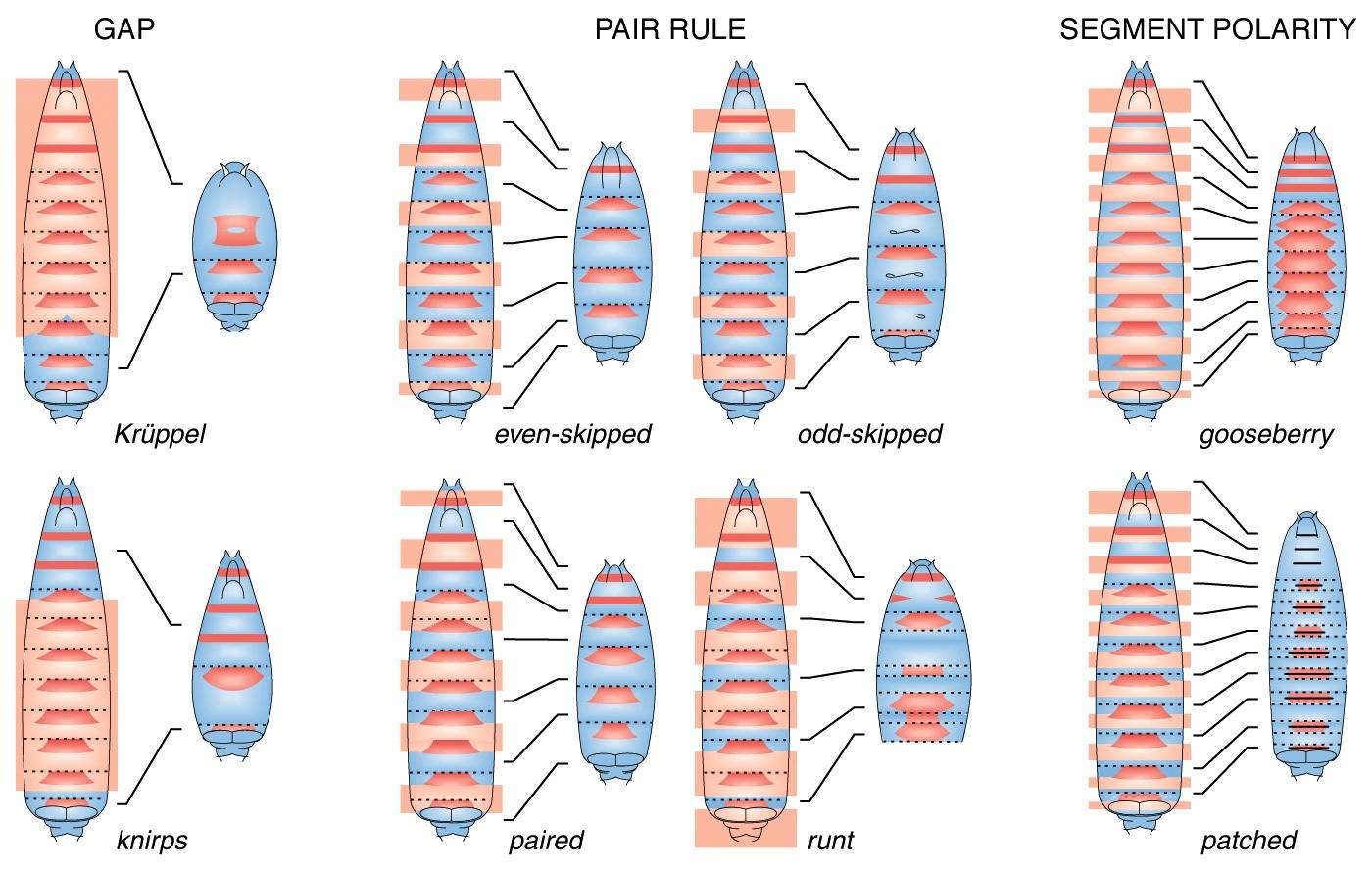ショウジョウバエの発生
ショウジョウバエの胚発生/Two color time lapse movie of Drosophila embryo rikenchannel チャンネル登録者数 2.74万人 チャンネル登録 受精後約4時間の細胞性胞胚期の胚を8時間にわたり撮影した。この間に、原腸陥入(00:30)、胚帯伸長(01:00)が起き、伸長した尾部が頭部に接する海老反り方の形態をとる 胚帯伸長期(03:00)には気管の陥入、神経芽細胞の生産などが盛んに起きる。04:20からは胚帯短縮が始まり07:00には短縮が完了して、体節の繰り返し構造が明確になる。
- ショウジョウバエが教える驚きの発生メカニズム理化学研究所 多細胞システム形成研究センター 林 茂生 https://www.chart.co.jp/subject/rika/scnet/59/Snet59-3.pdf 卵殻の限られた空間で伸長した胚はえび反りのかたちをとった状態で3胚葉の構造を取り,繰り返し構造が目に見えるようになります(図2C:胸部,腹部に形成される気管の原基の繰り返しが見える)。続いて頭尾軸は短縮し(図2D:胚帯短縮),体節が明瞭な幼虫の形態となります(図2E)。
体節形成に関与する遺伝子の数々はショウジョウバエの発生学遺伝学研究で明らかになりました。
- 5分でわかる!ショウジョウバエのホメオティック遺伝子 TryIt https://www.try-it.jp/chapters-15244/sections-15293/lessons-15302/point-2/
- https://bio.libretexts.org/Bookshelves/Introductory_and_General_Biology/Biology_(Kimball)/14%3A_Embryonic_Development_and_its_Regulation/14.05%3A_Segmentation_-_Organizing_the_Embryo The body of Drosophila melanogaster is built from 14 segments: 3 segments make up the head with its antennae and mouth parts. 3 segments make up the thorax. Each thoracic segment has a pair of legs (insects are the six-legged creatures). In Drosophila (and other flies), the middle thoracic segment carries a single pair of wings; the hind segment a pair of halteres. 8 abdominal segments.
発生を規定する遺伝子群の概説
ショウジョウバエの発生を決める遺伝子は高校の生物で学ぶようです。
【高校生物】 動物の発生12 形態形成:体節決定(12分) 映像授業 Try IT(トライイット) チャンネル登録者数 71.9万人 チャンネル登録
- TryIt 高校生物 5分でわかる!体節決定 動画集 https://www.try-it.jp/chapters-15244/sections-15293/lessons-15298/point-2/
- https://www.sciencedirect.com/topics/biochemistry-genetics-and-molecular-biology/pair-rule-gene
- Concentration dependent chromatin states induced by the bicoid morphogen gradient Sep 11, 2017 https://doi.org/10.7554/eLife.28275 eLIFE https://elifesciences.org/articles/28275
- The gap gene network Cell Mol Life Sci. 2011 Jan; 68(2): 243–274. Published online 2010 Oct 8. doi: 10.1007/s00018-010-0536-y PMCID: PMC3016493 PMID: 20927566
- Formation of the bicoid morphogen gradient: an mRNA gradient dictates the protein gradient Development. 2009 Feb 15; 136(4): 605–614. Published online 2009 Jan 23. doi: 10.1242/dev.031195 PMCID: PMC2685955 PMID: 19168676 https://www.ncbi.nlm.nih.gov/pmc/articles/PMC2685955/
- Pre-Steady-State Decoding of the Bicoid Morphogen Gradient Published: February 6, 2007 https://doi.org/10.1371/journal.pbio.0050046
ショウジョウバエを用いて生き物の体がどのようにしてできてくるのかを調べるときに、遺伝子をランダムに壊して、その結果ある遺伝子が壊れときにはどのような「奇形」(表現型)が生じてくるかを調べるという戦略がもちいられました。
ショウジョウバエの幼虫は14個の体節からなります。遺伝子を破壊する研究により、代表的な奇形のパターンとして、GAP、PAIR RULE、SEGMENT POLARITYの3つが浮かび上がってきました。ギャップというのは、胴体の一部分がごそっとなくなる表現型です。ペアルールというのは、体節が一個おきになくなるもので、偶数番目の体節がなくなるのがeven-skippedで、奇数番目の体節がなくなるのがodd-skippedになります。セグメントポラリティは、ひとつの節の領域の一部がなくなるものです。
 https://www.mun.ca/biology/scarr/Zygotic_Genes.html
https://www.mun.ca/biology/scarr/Zygotic_Genes.html
ギャップ遺伝子群

 (ウィキペディア gap gene)
(ウィキペディア gap gene)ペアルール遺伝子群
https://en.wikipedia.org/wiki/Pair-rule_gene
odd-paired遺伝子
odd-paired (opa)はペアルール遺伝子の一つ。
- Cell-specific occupancy dynamics between the pioneer-like factor Opa/ZIC and Ocelliles/OTX regulate early head development in embryos Posted December 16, 2022. https://www.biorxiv.org/content/10.1101/2022.12.15.519123v1.full
- Odd-Paired: The Drosophila Zic Gene Adv Exp Med Biol . 2018:1046:41-58. doi: 10.1007/978-981-10-7311-3_3. https://pubmed.ncbi.nlm.nih.gov/29442316/ Zinc finger in the cerebellum (Zic) proteins are a family of transcription factors with multiple roles during development, particularly in neural tissues. The founding member of the Zic family is the Drosophila odd-paired (opa) gene. The Opa protein has a DNA binding domain containing five Cys2His2-type zinc fingers and has been shown to act as a sequence-specific DNA binding protein. Opa has significant homology to mammalian Zic1, Zic2, and Zic3 within the zinc finger domain and in two other conserved regions outside that domain. opa was initially identified as a pair-rule gene, part of the hierarchy of genes that establish the segmental body plan of the early Drosophila embryo. However, its wide expression pattern during embryogenesis indicates it plays additional roles. Embryos deficient in opa die before hatching with aberrant segmentation but also with defects in larval midgut formation. Post-embryonically, opa plays important roles in adult head development and circadian rhythm.
- Odd-paired is a pioneer-like factor that coordinates with Zelda to control gene expression in embryos Jul 23, 2020 https://doi.org/10.7554/eLife.59610
- Odd-paired controls frequency doubling in Drosophila segmentation by altering the pair-rule gene regulatory network Erik Clark Is a corresponding authorMichael Akam University of Cambridge, United Kingdom Aug 15, 2016 https://doi.org/10.7554/eLife.18215 https://elifesciences.org/articles/18215
- Odd paired transcriptional activation of decapentaplegic in the Drosophila eye/antennal disc is cell autonomous but indirect Developmental Biology Volume 343, Issues 1–2 , 1–15 July 2010, Pages 167-177 https://www.sciencedirect.com/science/article/pii/S0012160610002332 The gene odd paired (opa), a Drosophila homolog of the Zinc finger protein of the cerebellum (Zic) family of mammalian transcription factors, plays roles in embryonic segmentation and development of the adult head.
- Emerging roles for zic genes in early development Christa S. Merzdorf First published: 01 March 2007 https://anatomypubs.onlinelibrary.wiley.com/doi/10.1002/dvdy.21098
- The Zic family member, odd-paired, regulates the Drosophila BMP, decapentaplegic, during adult head development 01 April 2007 DEVELOPMENT https://journals.biologists.com/dev/article/134/7/1301/53041/The-Zic-family-member-odd-paired-regulates-the … However, the postembryonic role of opa is completely unknown. … We find that opa is expressed in the eye/antennal disc, primarily in the peripodial epithelium of this structure. Loss of opa function during eye/antennal disc development results in defects in ventral head structures identical to those observed with loss of dpp.
その他の重要な遺伝子
engrailed
- engrailed is a homeodomain transcription factor https://en.wikipedia.org/wiki/Engrailed_(gene)
- Spatial and temporal control elements of the Drosophila engrailed gene Judith A. Kassis GENES & DEVELOPMENT 4:433-443 1990 https://genesdev.cshlp.org/content/4/3/433.full.pdf